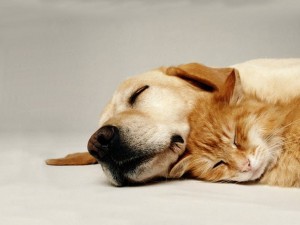 As pets age, just like people, their cognitive function tends to decline. Cognitive dysfunction is the loss of behaviors such as learning, remembering and concentration.
As pets age, just like people, their cognitive function tends to decline. Cognitive dysfunction is the loss of behaviors such as learning, remembering and concentration.
The following are several symptoms of cognitive dysfunction in pets.
Disorientation: Lost in familiar place, not recognizing familiar people, going to wrong side of door, etc.
Interactions: Altered interaction between owner and dog, may be more clingy, disinterested or irritable.
Sleep-Wake Cycles: May sleep more during day and less at night.
House Soiling: Soils in areas that they were unlikely to before, i.e. dogs may soil inside house or in unusual places outside. Cats may soil outside litter box. As pets age their need to eliminate may increase, dogs may need more trips outside, and cats may need extra litter boxes.
Two additional symptoms are:
Anxiety and Agitation: such as vocalization, new fears or phobias. More clingy and overly dependent on owner.
Learning and Memory: Unable to perform tasks previously taught. Unable or slowly adapting to any changes in household and schedules.
You can help your pet maintain brain health through exercise, new toys, training and social interactions. If additional help is needed, working with your veterinarian can help your pet overcome some of these symptoms with proper treatments.
It is important to have annual wellness exams for your pet, especially an older pet, to detect or rule out any underlying medical problems that may mimic symptoms of cognitive dysfunction. Be sure to discuss any behavior changes with your veterinarian. The earlier a problem is detected and treated the more likely we can help him/her live a longer, healthier, and happy life.
Get more information by searching cognitive dysfunction at: https://www.communityanimalhosp.com/pet-resources/articles.html
Tags: aging cats, aging dogs, aging pets, cognitive dysfunction in pets, older pet care







